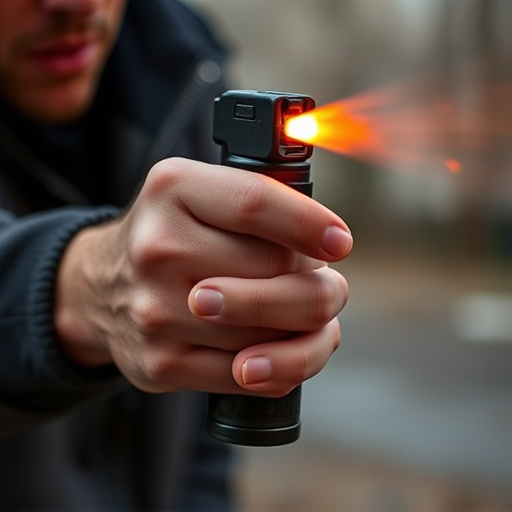TL;DR:
Pets exposed to pepper spray need immediate rinsing with abundant water for at least 15 minutes to remove capsaicin. Move them to a well-ventilated area, remove contaminated clothing and debris from fur. Monitor for symptoms like coughing, breathing difficulties or excessive panting. Seek veterinary care if symptoms persist or worsen. Provide a calm environment, ensure hydration and consider regular grooming sessions post-exposure to prevent lasting harm.
“In today’s world, civilians are increasingly armed with pepper defense spray for personal safety. However, these powerful tools can also pose risks to pets if accidentally exposed. This article delves into the intricacies of civilian-grade pepper defense spray, its effects on animals, and offers crucial guidance on treating pets exposed to pepper spray. Understanding these aspects is vital to ensure your furry companions’ well-being alongside effective self-defense.”
- Understanding Pepper Spray and Its Effects on Pets
- What Is Civilian Grade Pepper Defense Spray?
- Treating and Caring for Pets After Exposure to Pepper Spray
Understanding Pepper Spray and Its Effects on Pets
Pepper spray, a non-lethal self-defense tool, contains capsaicin, the same compound that gives chili peppers their heat. When sprayed, it irritates the eyes and respiratory system, temporarily disabling an aggressor. However, pets are especially vulnerable to its effects due to their smaller size and sensitivity. Exposure can cause severe discomfort, including tearing, coughing, difficulty breathing, and even panic attacks in dogs and cats.
Treating pets exposed to pepper spray requires immediate action. Rinse the affected area thoroughly with water for at least 15 minutes. Seek veterinary care if symptoms persist or worsen, as capsaicin can remain active on fur and potentially cause continued irritation. Provide a calm environment and ensure your pet stays hydrated. Regular grooming sessions after exposure can also help remove any residual spray chemicals from their coat.
What Is Civilian Grade Pepper Defense Spray?
Civilian-grade pepper defense spray is a non-lethal self-defense tool designed for personal safety, often used by law enforcement and civilians alike. Unlike military-grade options, it’s specifically formulated to be safer for use in densely populated areas and around sensitive areas like eyes and mouths. This type of spray typically contains capsaicin, the active ingredient found in chili peppers, which irritates the respiratory system and temporarily disables an assailant.
When pets are exposed to civilian-grade pepper defense spray, proper treatment is crucial. Just like humans, animals can suffer from irritation and discomfort, especially in the eyes, nose, and lungs. If your pet comes into contact with such spray, immediately move them to a well-ventilated area, remove any contaminated clothing or debris from their fur, and rinse their face and paws thoroughly with water. Observing your pet for signs of distress or difficulty breathing is essential, and seeking veterinary care might be necessary if symptoms persist or worsen.
Treating and Caring for Pets After Exposure to Pepper Spray
After pets are exposed to civilian-grade pepper defense spray, proper treatment and care are essential. The first step is to immediately rinse the affected areas with plenty of water, ensuring that all traces of the spray are washed away. This simple action can prevent further irritation or discomfort for your furry friends.
Additionally, keep your pet calm and comfortable during and after the cleaning process. Avoid any strenuous activities or exercises until you’re certain they are no longer sensitive to the spray. Regular monitoring is key; check for any signs of persistent coughing, difficulty breathing, or excessive panting, as these could indicate prolonged exposure. Consulting a veterinarian is recommended if symptoms persist, ensuring your pet receives the best possible care and attention.
Pepper spray, particularly civilian-grade varieties, can have significant effects on pets if they are exposed. Understanding its composition and impact is crucial for those who own animals. In cases of exposure, prompt action is essential in treating pets exposed to pepper spray. This includes moving the pet to a safe, well-ventilated area, removing contaminated clothing, and seeking veterinary care immediately. With proper care, most pets can recover fully from pepper spray incidents.
